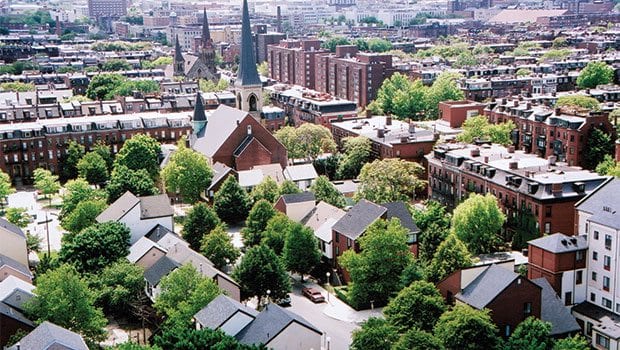IBA looks back at 50 years of community achievements
The organization is rooted in Puerto Rican activism in Boston’s South End

For the past half-century, the community development corporation Inquilinos Boricuas en Acción has helped the Puerto Rican and Latino communities persevere and thrive in the South End. August 28, 2018 will mark IBA’s 50th year of working towards displacement prevention, anti-gentrification, education, and economic mobility in the South End and beyond.

Author: Dan Busler PhotographyIBA CEO Vanessa Calderon-Rosado speaks at Nov. 8 50th anniversary kick-off event

Author: Archival Photography Courtesy of Northeastern University Libraries, Archives and Special Collections DepartmentPrevious IBA executive director Jorge Hernandez giving tour of Villa Victoria. [ca. 1975-1985]
This month, IBA launched a year-long celebration of their anniversary with a series of events leading up to it: a history forum on Apr. 11, Festival Betances on July 21–22, and the 50th anniversary gala on Nov. 3, 2018.
“As we reflect on our past and our founders, we can’t help but think about the legacy that a community can leave behind,” said IBA CEO Vanessa Calderon-Rosado. “Our founders knew that their community needed affordable housing, economic and educational programs, and residential services, but they also knew that they had the power and the will to make it happen.”
IBA’s tagline for their anniversary is “Let’s build 50,” which means, “Let’s build the next 50 years and continue to build affordable housing, learning opportunities, economic mobility and creative spaces for Greater Boston’s minority and low-income residents,” said Calderon-Rosado.
The organization announced its fundraising goal of $250,000 to carry on the mission that was kicked off with a $25,000 donation from The Boston Foundation, a longtime IBA supporter.
In addition, IBA plans to add additional units of affordable housing to its portfolio after being selected by the Boston Planning and Development Authority as the designated developer on a 146-unit affordable housing rehab project in the South End.
“We’re excited about being able to preserve the affordability of all those units and keep the tenants in place,” said Calderon-Rosado.
Historic milestones
A five-foot miniature house exhibit will be installed in the community as a symbolic representation of how the contributions of many individuals can build affordable, inclusive and diverse communities. Individuals can purchase parts that will be used to build the installation. The funds will go towards supporting IBA’s programs.
IBA was established in 1968 when residents of the BRA-designated Parcel 19 in the South End faced displacement and gentrification from Boston’s urban renewal plan. They organized, protested and rallied and succeeded in gaining control over their housing.
Since then, the organization has reached many landmark achievements. Most notably, in 1970, IBA began developing Villa Victoria, a 435-unit affordable housing community, with HUD funding. Today, IBA has expanded the community to 521 affordable units.
In 1976, IBA established Escuelita Agueybana, the first accredited bilingual preschool in the state.
The Villa Victoria Center for the Arts opened in 1986 which is “the hub of Latino arts in New England and creates social collaboration with other artists and communities,” said Calderon-Rosado.
In 1993, Residencia Betances opened its doors to serve formerly homeless and Spanish-speaking clients from the Department of Mental Health and was newly renovated last year.
And most recently, IBA merged with the ETC Development Corporation in 2013, “creating an economy to scale to take on bigger projects to better serve our families and residents,” said Calderon-Rosado. This merger has allowed the organization to take on projects like the redevelopment of the 146 BPDA units.
Remembering the past
Among those who witnessed and contributed to IBA’s growth is Puerto Rican native Jovita Fontanez. She moved into Boston’s South End during the ’50s as a child, at a time when “there was not a big Latino community.”
When the fight to save Parcel 19 occurred, Fontanez was living on Dartmouth Street, “but we were a small community and everyone was involved in the fight,” she said.
“It was an interesting time because I’m sure many of us didn’t know what we were doing but we knew we had to save the parcela,” recalled Fontanez.
Fontanez, the first Hispanic woman to serve as head of the Boston Election Comission, previously served on IBA’s board and still remains active to this day, especially when it comes to maintaining and securing funds from foundations with her passionate, yet tough-as-nails attitude. “I’m not shy about picking up the phone and saying, ‘This is Jovita, what do you mean you’re not going to fund us?’”
Frieda Garcia, a longtime supporter of IBA, recalls the time when she first discovered the nonprofit while on assignment as a social worker for Roxbury Multi-Service Center in 1967.
It was right before IBA became officially incorporated but “it was the only agency that completely blew me out of the water,” said Garcia. “Their professionalism and record keeping was very impressive.”
Garcia has been involved with IBA since the ’70s, “but it was always in the supportive capacity when they needed bodies,” she said.
“In those days, most of the key social service agencies were in Beacon Hill or Downtown,” said Garcia. “Roxbury Multi-Service Center was the first professional agency in Roxbury, and using that as my measuring stick, I was so impressed by IBA.”
Her support continued when she became executive director of United South End Settlements in the ’80s, when IBA was developing housing at full force.
Looking back at IBA’s 50 years, Fontanez said, “It’s a tribute to the strong leadership over the years, especially when things got really hard.”
She added, “With the South End getting so gentrified, to have Villa Victoria and understand its importance to the community, is just a godsend.”






